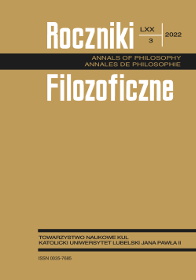Aristotle and the Beginnings of the Concept of the Universal
Abstract
The aim of this paper is to discuss Aristotle’s concept of the universal, and in particular to defend the claim that Aristotle’s concept is different from the modern concept of the universal, which is understood as the entity common to many individuals. For Aristotle, the universal is first and foremost an object which is predicated, is the object of the acts of the intellect, and is the object of the definition. In the text I also show that universals in Aristotle’s theory are causally inert, so they cannot be properties or causes of properties of individuals. This makes them similar to the modern concept of abstract objects such as Frege’s senses. The immediate point of reference for this paper is Paweł Rojek’s book Tropy i uniwersalia. Badania ontologiczne [Tropes and Universals: Ontological Investigations] (2019). I argue here against Rojek’s reading of the classical concept of the universal, and above all, against his interpretation of the theory of Thomas Aquinas.
References
Ackrill, John. 1963. Aristotle’s Categories and De Interpretatione. Oxford: Clarendon Press.
Apostle, Hippocrates G. 1980. Aristotle’s Categories and Propositions (De Interpretatione). Grinnell: Peripatetic Press.
Aristotle. 2014. Metaphysics. Indianapolis/Cambridge: Hackett.
Armstrong, David M. 1989. Universals: an Opinionated Introduction. Boulder: Westview Press.
Cohen, Sheldon Marc. 2008. „Kooky Objects Revisited: Aristotle’s Ontology”. Metaphilosophy 39: 3–19. DOI: https://doi.org/10.1111/j.1467-9973.2008.00521.x.
Cohen, Sheldon Marc. 2013. „Accidental Beings in Aristotle’s Ontology”. W: Reason and Analysis in Ancient Greek Philosophy: Essays in Honor of David Keyt, red. Georgios Anagnostopoulos i Fred D. Miller, Jr., 231–242. Dordrecht: Springer.
Crivelli, Paolo. 2015. „Aristotle’s Definitions of Universals and Individuals in de Intepretatione 7”. W: Nominalism about Properties. New Essays, red. Ghislain Guigon i Gonzalo Rodriguez-Pereyra, 19–37. New York: Taylor & Francis.
Dancy, Russell. 1975. „On Some of Aristotle’s First Thoughts about Substances”. Philosophical Review 84: 338–375. DOI: https://doi.org/10.2307/2184117.
De Libera, Alain. 1996. La querelle des universaux. De Platon à la fin du Moyen Âge. Paris: Seuil.
Fine, Gail. 1993. On Ideas. Aristotle’s Criticism of Plato’s Theory of Forms. Oxford: Oxford University Press.
Frede, Michael. 1987. Essays on Ancient Philosophy. Minneapolis: University of Minnesota Press.
Galluzo, Gabriele. 2008. „The Problem of Universals and its History. Some General Considerations”. Documenti e Studi sulla Tradizione Filosofica Medievale 19: 335–369.
Gill, Mary Louise. 2005. „Aristotle’s Metaphysics Reconsidered”. Journal of the History of Philosophy 43, no. 3: 223–241. DOI: https://doi.org/10.1353/hph.2005.0138.
Hadot, Pierre. 1980. „Sur divers sens du mot ‘pragma’ dans la tradition philosophique grecque”. W: Concepts et catégories dans la pensée antique, ed. Pierre Aubenque, 309–320. Paris: Vrin.
Lewis, Frank. 1991. Substance and Predication in Aristotle. Cambridge: Cambridge University Press.
Matthews, Gareth B. 1982. „Accidental unities”. W: Language and logos: Studies in Ancient Greek Philosophy, red. Malcolm Schofield and Martha Craven Nussbaum, 223–240. Cambridge: Cambridge University Press.
Modrak, Deborah. 2001. Aristotle’s Theory of Language and Meaning. Cambridge: Cambridge University Press.
Owen, Gwilym Ellis Lane. 1965. „Inherence”. Phronesis 10: 97–105: 97–105.
Panaccio, Claude. „Universals”. W: Oxford Handbook of Medieval Philsophy, red. John Marenbon, 385–402. Oxford: Oxford University Press.
Rodriguez-Pereyra, Gonzalo. 2000. „What is the Problem of Universals?”. Mind 109: 255–273. https://www.jstor.org/stable/2660134.
Rojek, Paweł. 2019. Tropy i uniwersalia. Badania ontologiczne. Warszawa: Semper.
Rosen, Gideon. 2017. „Abstract Objects”. W: The Stanford Encyclopedia of Philosophy (Summer 2017 Edition), red. Edward N. Zalta, https://plato.stanford.edu/archives/sum2017/entries/abstract-objects. Dostęp 19.08.2022.
Ross, William David. 1924. Aristotle’s Metaphysics, t. I–II. Oxford: Clarendon Press.
Tiuryn, Tomasz. 2009, Boecjusz i problem uniwersaliów. Monografie FNP. Wrocław: Wydawnictwo Uniwersytetu Wrocławskiego.
Tiuryn, Tomasz. 2015. „Przedmiot poznania i definicji. Problem uniwersaliów w ujęciu
Boecjusza i Aleksandra z Afrodyzji”. Archiwum Historii Filozofii i Myśli Społecznej 60: 25–47.
Tiuryn, Tomasz. 2016a. „Z powrotem do Arystotelesowskiej teorii znaczenia”. Przegląd Tomistyczny 21: 347–408.
Tiuryn, Tomasz. 2016b. „Forma, natura, ogólność. Aleksandra z Afrodyzji koncepcja uniwersaliów”. Archiwum Historii Filozofii i Myśli Społecznej 61: 59–77.
Tiuryn, Tomasz. 2018a. „Wprowadzenie do Arystotelesowskiej filozofii języka”. W: Arystoteles. Peri hermeneias (Hermeneutyka). Tłum. Tomasz Tiuryn, 1–118. Kęty: Wydawnictwo Marek Derewiecki.
Tiuryn, Tomasz. 2018b. „Teoria semantyczna Arystotelesa”. W: Arystoteles. Peri hermeneias (Hermeneutyka). Tłum. Tomasz Tiuryn, 505–564. Kęty: Wydawnictwo Marek Derewiecki.
Tiuryn, Tomasz. 2021. „The Notion of ‘pragma’ in Aristotle’s Theory of Signification”. Przegląd Tomistyczny 27: 123–158.
Tweedale, Martin. 1987. „Aristotle’s Universals”. Australasian Journal of Philosophy 65: 412–426. DOI: https://doi.org/10.1080/00048408712343051.
Tweedale, Martin. 1988. „Aristotle’s Realism”. Canadian Journal of Philosophy 18, no. 3: 503–526. DOI: https://doi.org/10.1080/00455091.1988.10717188.
Wedin, Michael. 2000. Aristotle’s Theory of Substance. The Categories and Metaphysics Z. Oxford: Oxford University Press.
Weidemann, Hermann. 1994. „Anmerkungen”. W: Aristoteles. Peri hermeneias. Przekład i komentarz Hermann Weidemann, 133–473. Berlin: Akademie Verlag.
Copyright (c) 2022 Roczniki Filozoficzne

This work is licensed under a Creative Commons Attribution-NonCommercial-NoDerivatives 4.0 International License.





